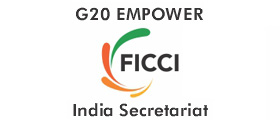-
The Indian government’s flagship financial inclusion scheme - Prime Minister’s Public Finance Scheme (Pradhan Mantri Jan Dhan Yojana)- has till date covered 46 crores (460 million) bank accounts with a deposit balance of INR 1.74 lakh crore (USD 2142 billion approx.) and has expanded its coverage to 67% rural or semi-urban areas with an aim to expand affordable access to financial services such as bank accounts, remittances, credit, insurance and pensions. Around 56% of jan dhan (public finance) account holders are women.
Under Prime Minister Rural Welfare Scheme (Pradhan Mantri Garib Kalyan Yojana) started during the COVID-19 crisis, the Indian government linked the Pradhan Mantri Jan Dhan Yojana with the beneficiary’s ‘aadhar’ (a biometric identity card) number and mobile phone number to facilitate a transfer of INR 500 (USD 55 approx.) per month. This initiative amounted to INR 9,930 crores (USD 1.2 billion approx.), benefitting 19.86 crores (198 million) women.
Under DAY-NRLM (Deendayal Antyodaya Yojana-National Rural Livelihoods Mission) (a rural upliftment scheme) by the Ministry of Rural Development, women Self- Help Group (SHG) members are appointed as third-party business correspondents – locally known as Bank Sakhis (bank mates). These women are trained and then deployed to help other women with banking activities. Till February 2020, 6,094 Bank Sakhis across 12 states had collectively completed 748,454 transactions worth over INR 4 crore (USD 40 million approx.). It is estimated that Bank Sakhis could positively impact the financial inclusion of about 250 million women, who are not bank account holders yet. Under DAY-NRLM, collateral-free loans up to INR 20 lakhs (USD 24,479 approx.) are offered to women SHGs. The programme aims to cover at least one woman-member from each rural household with the objective to bring about 9-10 crore (90-100 million) women under the fold of SHGs. There are more than 69 lakh (6.9 million) SHGs presently covering more than 7.9 crores (79 million) rural women in India.
The Prime Minister Micro-credit Scheme (Pradhan Mantri MUDRA Yojana) provides loans of up to INR 10 lakhs (USD 12311 approx.) to non-corporate, non-farm small/micro enterprises run by female entrepreneurs wanting to start small new enterprises and businesses, as well as groups of women wanting to start a venture together. A total of INR 1,66,422 crores (USD 20.1 billion approx.) has been sanctioned to 38 million accounts of women entrepreneurs under this scheme – and 68% of the accounts are held by women entrepreneurs, who are currently availing 44% of the sanctioned loans.
The Startup India Seed Fund Scheme has been approved for a period of four years, starting from 2021. The scheme aims to provide financial assistance to start-ups, prioritising those that are led by women. Around 1,627 start-ups in the country are currently being led by women. There are 13 women-founded unicorns namely - Nykaa, Mamaearth, Hasura, The Good Glamm Group, Pristyn Care, OfBusiness, Lead School, Mobikwik, Acko Insurance, BYJU'S, Rivigo, Zenoti and Livspace. Initiatives under the Ministry of Skill Development and Entrepreneurship (MSDE) like 'Economic Empowerment of Women Entrepreneurs and Startups by Women' and NITI Aayog’s initiative-Women Entrepreneurship Platform-are also important endeavours under the umbrella of Startup India to make the start-up sector gender inclusive.
Further, the Stand Up India scheme facilitates bank loans between INR 10 lakh (USD 12260.1 approx.) and INR 1 crore (USD 122601 approx.) to at least one Scheduled Caste or Scheduled Tribe borrower and at least one-woman borrower per bank branch for setting up a greenfield enterprise. As of February 2020, more than 81% of account holders under the Stand Up India scheme are women. 73,155 accounts have been opened by women, and INR 16,712.72 crore (USD 2 billion approx.) has been sanctioned for women account holders, disbursing INR 9106.13 crore (USD 1.1 billion approx.).
Prime Minister’s Employment Generation Programme (PMEGP) is a Ministry of Micro, Small and Medium Enterprises, Government of India initiative to help women in setting up their own enterprises. The scheme is implemented by Khadi and Village Industries Commission (KVIC) functioning as the nodal agency at the national level. At the state level, the scheme is implemented through State KVIC Directorates, State Khadi and Village Industries Boards (KVIBs), District Industries Centres (DICs) and banks. In such cases KVIC routes government subsidy through designated banks for eventual disbursal to the beneficiaries / entrepreneurs directly into their bank accounts. Since its inception in 2008-09, about 7.8 lakh (0.78 million) micro enterprises have been assisted with a subsidy of Rs 19,995 Crore (approx. USD 2 BN) generating an estimated sustainable employment opportunities for 64 lakh (6.4 million) persons. About 80% of the units assisted are in rural areas and about 50% units are owned by SC, ST and women.
Spinning Mission (The Solar Charkha Mission) was launched in 2018 with a vision to establish clusters across the country that would have a focal village for surrounding villages in a radius of 8 to 10 kilometres. Such clusters will have beneficiaries including spinners, weavers, stitchers and other skilled artisans. One of the major objectives of the scheme is to ensure inclusive growth by generating jobs for women.
The Ministry of New and Renewable Energy has been supporting Capacity-Building Programmes for Skill Development in Renewable Energy including Solar Energy (Suryamitra), Wind Energy (Vayumitra), and Small Hydro Power (Jalurjamitra). The Suryamitra skill development programme is being implemented since financial year 2015-16, wherein 2251 women candidates were trained since the inception of the programme. As of November 2022, 836 candidates have reported to be employed.

